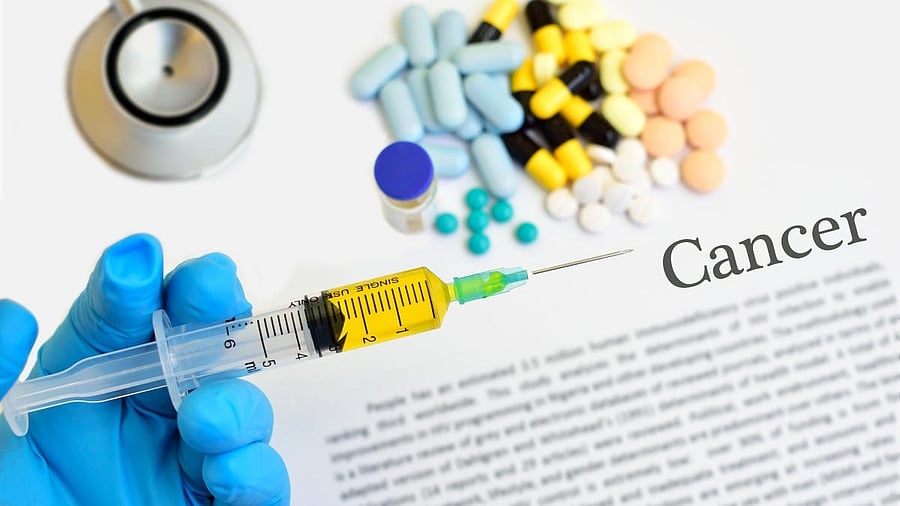
Syringe with drugs for cancer treatment.
Credit: Getty Images
Cancer is a complicated disease. Globally, it is one of the major causes of morbidity and mortality. A critical challenge associated with it is the difficulty of accurately diagnosing it at an early stage. The malignancy due to multistage and heterogeneity that result from genetic and epigenetic modifications poses a critical challenge to diagnose and monitor the progress at an early stage.
Though there are different types of cancer treatments including conventional surgery, chemotherapy, immunotherapy, and radiotherapy that are available, these treatments are not very attractive.
Despite there being plenty of known techniques available for the detection of solid tumours, highly advanced strategies are still essential to track disease onset, and analyse response in patients to improve prognosis, enhance the quality of life and improve the recovery rate in patients. Comprehensive molecular profiling of patient tumours has been widely studied over the last few years in a variety of cancers, leading to the development of a new discipline termed “personalised” or “precision” medicine. It is becoming standard practice for most patients with advanced disease, replacing the historical treatment paradigm of prescribing standard chemotherapy based on the tumour’s organ of origin, histology, and stage. This approach has allowed oncologists to reorganise the way they think about cancer and to make treatment recommendations based on genomic drivers of tumorigenesis.
Molecular profiling refers to the assessment of DNA, RNA, and/or proteins within an individual patient’s cancer using cells obtained from a tumour biopsy or through the capture of tumour cells obtained from different biological fluids.
Cancer diagnosis is often based on the panel of genomic and proteomic biomarkers. At various stages of cancer, the validation of drugs, evaluation, and drug response are carefully monitored, for which antigens associated with tumours are used as standard biomarkers.
In the case of nucleic acid-based biomarkers, they are attractive due to their accuracy and the possibility of simultaneous detection. However, the nuclease can break down under physiological conditions, become toxic, and change the metabolism, which is a potential drawback.
The proteomic biomarkers have weak clinical performance, and the original claims fail validation. Enzyme-related proteins serve as important biomolecules for cancer biomarkers. However, only a limited number of protein biomarkers are available which will not completely network the clinical purpose. Furthermore, an abundant protein found in the human body may interfere with our analyte of interest, so automatically, due to non-specific adsorption, the sensitivity, and selectivity are minimised.
Microfluidic systems are anticipated to emerge as a critical technology for cancer diagnosis and prognosis, although they are not being used in clinical settings to date. To avoid the use of tumour tissue biopsies, microfluidic devices have been designed for the investigation of a variety of biomarkers including circulating tumour cells, cell-free DNA, exosomes, and proteins, largely in liquid biopsies such as serum, plasma, and whole blood. The advantages of this technique include rapid analysis time, minimum sample requirement and non-existence of the interpretation issues in comparison with tissue samples. All these techniques are evidence of the indispensable role of biosensors in cancer diagnosis.
Developing next-generation diagnostic methods by utilising their binding affinity with other components is necessary to bring this decentralisation testing on par with cancer detection and controlling non-specific adsorption issues.
Moreover, lab-on-a-chip technology can be used to build advanced diagnostics, considerably reducing the challenge of exposure and transmission concerns in a non-invasive compact approach.
The diagnosis of cancer has undergone a paradigm shift. No longer is cancer diagnosed only based on morphological parameters.
A society free of cancer will result from the advancement of all biomarkers. The diagnostic algorithm is supported by immunohistochemical and molecular alterations at the DNA, RNA and proteomic levels.
Multiple platforms and high throughput technological advances enable faster and cheaper analysis of all these and the whole genome.
The ultimate goal of cancer diagnosis in personalised medicine would be to identify the correct diagnosis and guide the therapy so that every patient receives precision medicine that is the right drug at the right dose.
(The author is a molecular biologist.)